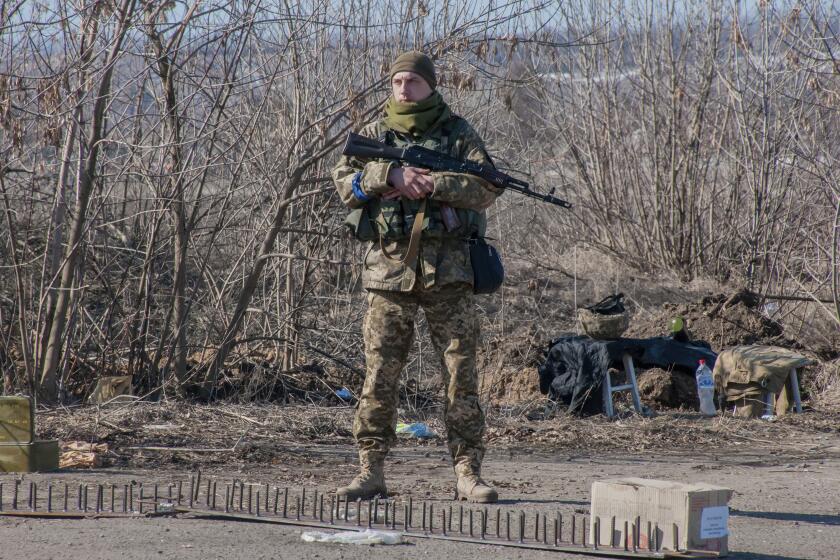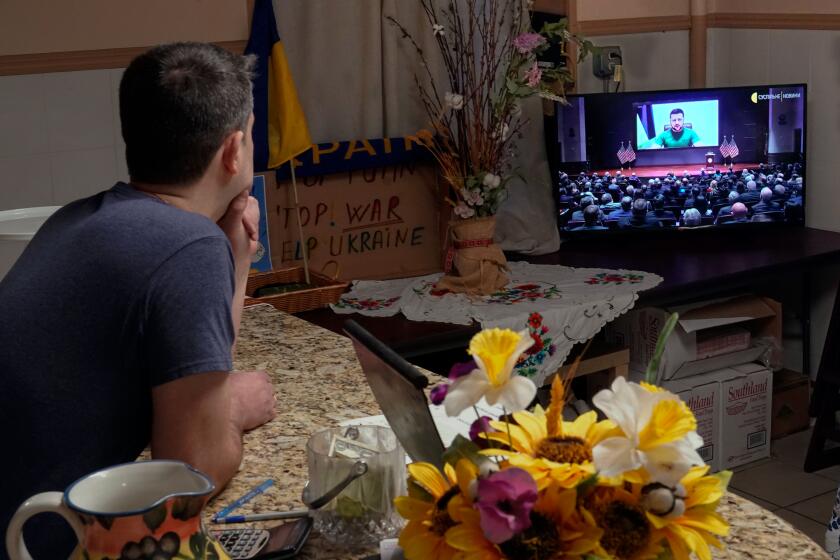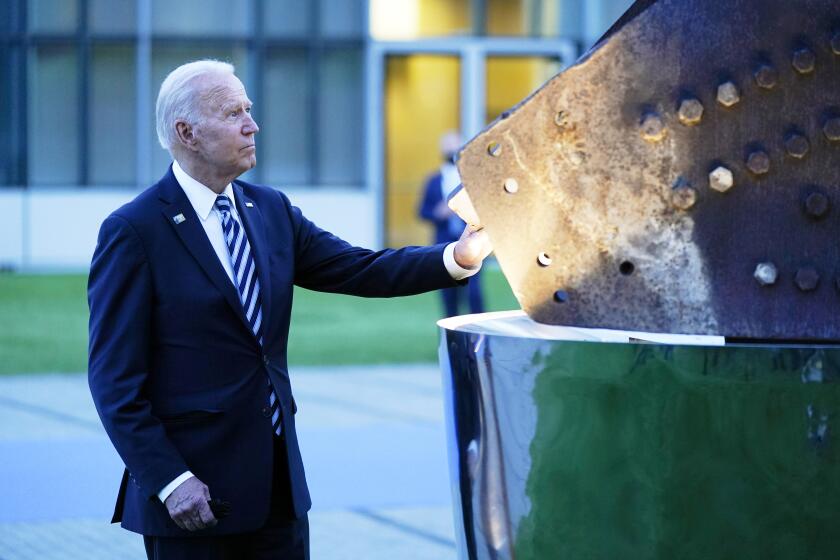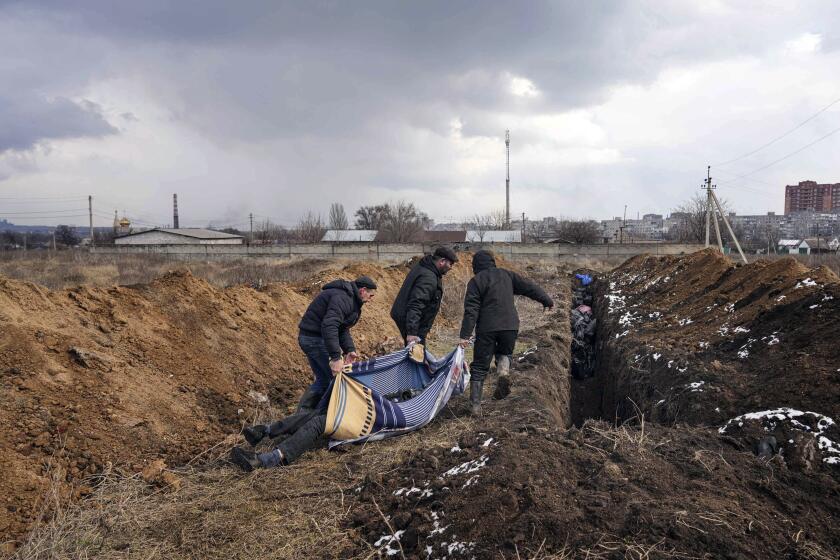In emergency meetings, Biden, NATO allies bolster response to Russia over Ukraine war

President Biden and Western allies have pledged billions of dollars in humanitarian aid for Ukraine as well as new sanctions against Russians in response to Vladimir Putin’s invasion of his country’s neighbor.
WASHINGTON — President Biden and leaders of NATO allies agreed to double the organization’s troop presence in Eastern Europe during a flurry of wartime summitry Thursday in Brussels, an effort to keep the alliance united in its effort to isolate and punish Russia for its invasion of Ukraine.
The White House also announced new sanctions against more than 400 Russian elites, Duma lawmakers and defense companies — one more turn of the screw in the West’s economic pressure campaign against Moscow. The Group of 7 leading industrialized nations, which joined in the new sanctions, disclosed initiatives aimed at cracking down on efforts by Russia to evade sanctions and preventing its central bank from using gold reserves to shore up the country’s sagging economy.
The U.S. also plans to accept 100,000 Ukrainian refugees into the country and to donate $1 billion to help European nations flooded with Ukrainians fleeing the war, Biden said at a news conference where he declared that NATO has “never been more united than it is today.”
Russian President Vladimir Putin, Biden said, “was banking on NATO being divided” and “is getting exactly the opposite what he intended to have, as a consequence of going into Ukraine.” While stressing that the U.S. and its allies hadn’t expected their actions alone to be enough to deter Putin, Biden said the “most important thing is for us to stay unified and focus on what a brute this guy is.”
The extraordinary gathering of leaders, planned in just days, was convened largely to send a signal of resolve to Putin while ensuring NATO allies remain on the same page as they plot additional measures against Moscow and prepare for scenarios that could draw them deeper into the conflict.
“We are determined to continue to impose consequences on Russia to bring about an end to this brutal war,” NATO Secretary-General Jens Stoltenberg said as he opened the meeting, expressing support for Ukraine, recognizing “the great courage” of its people and of those inside Russia “who are bravely speaking out against the war.”
Missile attacks and street battles raged as President Volodymyr Zelensky called on supporters to rally around the world to show that ‘Ukraine matters.’
“We hear the voices,” he said. “They matter.”
The meetings come one month to the day since the war began and at what could be a critical juncture for the fate of Ukraine, Europe and the world.
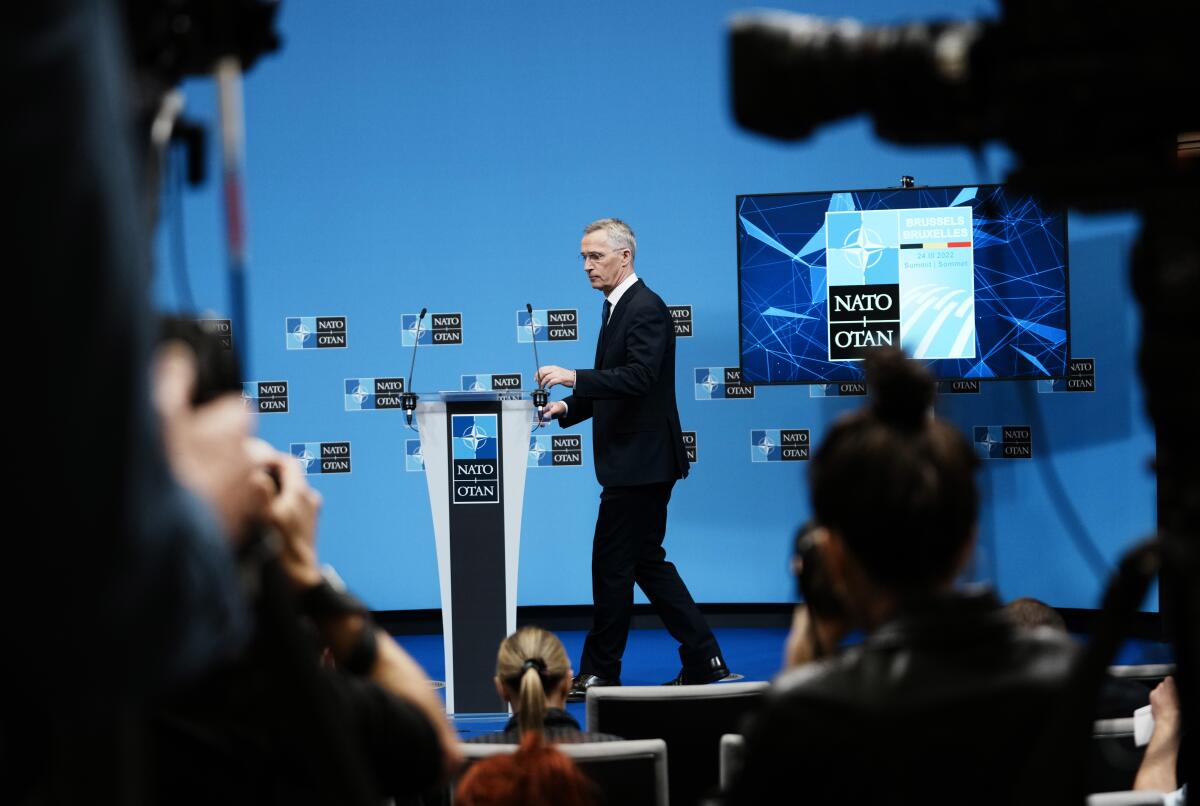
“Putin can’t afford to lose this struggle. By the same token, President Biden can’t afford to lose this struggle,” said Thomas Graham, a fellow at the Council on Foreign Relations who has handled Russia issues on the National Security Council in Democratic and Republican administrations.
Despite certain optimism in the West, Graham said, “there’s a great deal of devastation that Putin can do over the next several weeks.”
North Atlantic Treaty Organization leaders began a closed session Thursday after posing for a “family photo,” ratifying the plan Stoltenberg outlined Wednesday to double the number of battle groups in Eastern Europe. That will result in the deployment of more forces to Bulgaria, Hungary, Romania and Slovakia. The alliance had already doubled its initial troop presence on its eastern flank since Russia invaded Ukraine on Feb. 24.
“Today’s establishment of four new battle groups in Slovakia, Romania, Bulgaria and Hungary is a strong signal that we will collectively defend and protect every inch of NATO territory,” Biden said in a statement after the alliance leaders’ meeting.
The U.S. has 100,000 troops stationed in Europe, roughly 20,000 more than were there before Russia attacked.
Volodymyr Zelensky, Ukraine’s president, addressed the summit via video, asking the alliance to step up military assistance to help his country fight back.
Ukrainian President Volodymyr Zelensky’s virtual appearance before the U.S. Congress was just the latest in a series of rousing addresses.
“The world is waiting. Ukraine is waiting. For real action, for real security guarantees, from those whose word is to be trusted and whose actions can really preserve peace,” Zelensky said. “We need peace now. The response is yours.”
Zelensky has made similar requests in speeches to lawmakers in Washington, Berlin, Ottawa and other Western capitals in recent days.
Biden touted the $1 billion in new security assistance for Ukraine, which included antiaircraft systems, antitank missiles, drones, heavy weaponry and ammunition, telling reporters that “our weapons are flowing into Ukraine as I speak.” And he suggested in a statement that other countries would be sending additional aid: “We are committed to identifying additional equipment, including air defense systems, to help Ukraine.”
The president arrived in Brussels on Wednesday evening and also participated in meetings Thursday afternoon with the G-7 leaders and the European Commission. After a meeting with European Commission President Ursula von der Leyen on Friday morning, he planned to fly to Rzeszow, Poland, a city just 40 miles from the Ukrainian border that has become a hub for Western defense assistance going to Ukraine. He is scheduled to get a briefing on humanitarian efforts and to visit with U.S. troops before flying to Warsaw for a meeting Saturday with President Andrzej Duda.
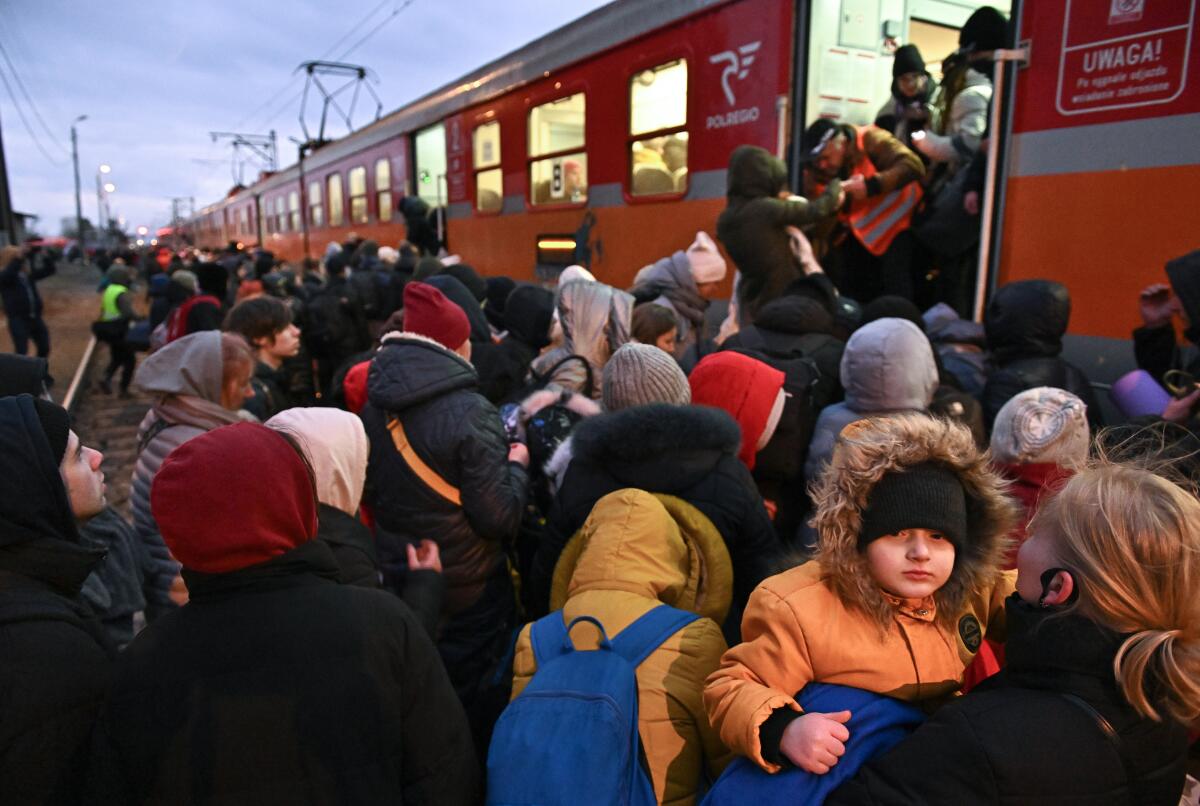
The president’s overseas trip is mostly about symbolism and keeping NATO together.
Under NATO’s Article 5, an attack against one member nation is considered an attack against all. Since Russia began its war in Ukraine, NATO members have imposed severe economic sanctions, taken steps to ban or limit imports of Russian energy and contributed billions in defense aid to Ukraine. They are attempting to punish Moscow as severely as possible while steering clear of any direct military engagement that Putin could use to justify expanding the conflict into NATO territory.
Putin, NATO allies fear, may seek to escalate the conflict out of frustration over his brazen campaign’s lack of progress. Russian officials seemed to have believed the invasion would take just days but instead it has bogged down as the war enters its second month. Perhaps as many as 15,000 Russian troops have been killed by Ukraine’s military and resistance fighters, who on Wednesday halted the eastern advance on the capital, Kyiv, and pushed back Russian forces several miles.
NATO agreed Thursday that it would provide Ukraine with detection and protective equipment, medical support and training for decontamination and crisis management in the event of a Russian chemical, biological, radiological or nuclear attack, Stoltenberg said. In a joint statement issued by the leaders of all 30 member nations, the alliance vowed that “any use by Russia of a chemical or biological weapon would be unacceptable and result in severe consequences.”
During his 30-minute news conference ahead of the third and final meeting with European Union leaders, Biden clarified that NATO “will respond” if Putin uses chemical weapons. “The nature of the response will depend on the nature of the use,” he said.
With Russia struggling to conquer Ukrainian territory, Putin has increasingly unleashed artillery, bombs and missiles against civilian targets, prompting Secretary of State Antony J. Blinken on Wednesday to formally declare that the U.S. has concluded Russia’s actions against Ukraine constitute war crimes.
Biden told reporters that leaders discussed expelling Russia from the Group of 20 major economies, which is scheduled to meet later this year in Indonesia, and that he favors the move. The U.S. succeeded in getting all 29 other NATO leaders to sign off on mentioning China by name in the joint statement after Thursday’s meeting and urging Beijing to “abstain from supporting Russia’s war effort in any way, and to refrain from any action that helps Russia circumvent sanctions.”
When questioned by reporters, the president expressed guarded optimism that Beijing would ultimately realize that a neutral posture would better serve its own strategic interests. “China understands that its economic future is much more closely tied to the West than it is to Russia,” Biden said.
Attacks on civilian targets, including apartment buildings, schools, a maternity ward and a theater said to be sheltering children, are cited.
The crisis in Ukraine has taken Biden’s chosen frame for his presidency — a historic confrontation pitting democracies versus autocracies — beyond the theoretical. It has also served as the impetus for reinvigorating a transatlantic alliance that, some seven decades after World War II, had seemed to be losing its focus and shared purpose.
“This war is accelerating Europe’s awakening to the real threat posed by Russia,” said Alexandra de Hoop Scheffer, transatlantic security research director for the German Marshall Fund.
“But it seems that the European Union has pretty much reached the limit of what it actually can do because if we really wanted to act seriously and cause pain to Russia, it would involve limiting our imports of gas and oil,” Scheffer said, adding that some countries have declared they cannot take such action.
Calling the coming days “a tipping-point phase of conflict” because Russia may be encountering difficulties on the ground while Ukraine is fighting hard but desperate for more aid, Scheffer said NATO countries needed to “accelerate our support before it’s too late. It’s not a question of months or weeks, it’s a question of days.”
More to Read
Get the L.A. Times Politics newsletter
Deeply reported insights into legislation, politics and policy from Sacramento, Washington and beyond. In your inbox three times per week.
You may occasionally receive promotional content from the Los Angeles Times.
